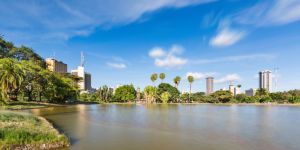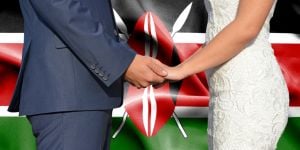Dear G,
I lived in Kisumu, Kenya for four years and spent a lot of time with Jaluos. They are a very friendly and hospitable people as a rule and the children are taught to be very polite unless they are in a group and spot you--then they will start shouting "Mzungu, mzungu, how are you?" You will hear that word a lot--mzungu. It means "foreign traveler" in Swahili but generally is used for a white person in Kenya. You will try to respond to all the people shouting at you but it is nearly impossible. I just smile and nod my head.
Personal greetings are a firm handshake for the men and women. Their mother tongue is Dholuo and is an oral language with only the Bible and a few books put into writing. Most of them cannot read it because it is not taught in the schools. Most of the older Luos do not usually speak Kiswahili or English.
Here is a website with some basic greetings: http://economics.ozier.com/language/dholuo.html
A majority of Luos live on or near Lake Victoria. Some generate income through fishing or subsistence farming including maize, beans, several types of greens, ground nuts (peanuts) chickens, goats, sheep and cattle. Avocados, mangos and papaya are around in abundance.
Kisumu is the third largest city in Kenya and is quite modern.
They are quite conservative in dress-the men wear long trousers and the women wear long skirts. They most likely will attend church -Saturday for 7th Day Adventists, Sunday for the other denominations. Church services are very long.
Time is relative based on activities not a clock. Be prepared to sit and wait. Things get started when everyone arrives.
As Longonot62 said, do not come empty handed for your visit but stop at a local grocery store and purchase unga flour, sugar, cooking oil, loose tea, packets of milk and some sweets for the children, bars of soap, toothpaste, etc. If you can pick up some tilapia, nile perch or a live chicken on your way--that will be very appreciated. Usually I give these items to the mother.
The basic foods are ugali (like polenta) and sukumawiki (fried greens) with maybe some type of meat or fish. Chai (black tea with milk and a lot of sugar) is a daily staple. Try it all but you do not have to finish all the food on your plate. Actually, if you clean your plate, they will offer you more food. It's better to leave just a little so they know you are full. Don't drink the water in Kenya unless it is bottled, boiled or filtered. The local brew is called chang'aa and can be fatal-so don't drink it! Sodas are cheap and it is a sign of respect if you buy her father and any of the older family members a soda--two are even better.
From experience--my advice is be very careful giving out any cash at this time until you know the family better. It's better to wait and get some input from your friend.
The roads in Kisumu, Siaya, Western counties can be very bad and so travel will take longer than you expect. If you go upcountry to her home village, be prepared to spend the night, especially if it rains. The roads can become impassable quite quickly.
The weather is hot and the sun is intense. Dress in comfortable and loose clothing with a hat. Malaria is endemic in the area so bring mosquito repellent from home as it is quite expensive here, bug spray (you can purchase at the local grocery store--it's called Doom!) and use a mosquito net diligently. Also, you will need to take a malarial preventative such as Malarone.
Karibu Kenya!
 Leisure activities in Kenya
Leisure activities in Kenya Marriage in Kenya
Marriage in Kenya Requirements for Foreigners to Live and Work in Kenya
Requirements for Foreigners to Live and Work in Kenya Moving with your pet to Kenya
Moving with your pet to Kenya kenya (yetu)
kenya (yetu) Registering company branch in kenya
Registering company branch in kenya Nairobi Expat Social (NES)
Nairobi Expat Social (NES) Banking in Kenya
Banking in Kenya


